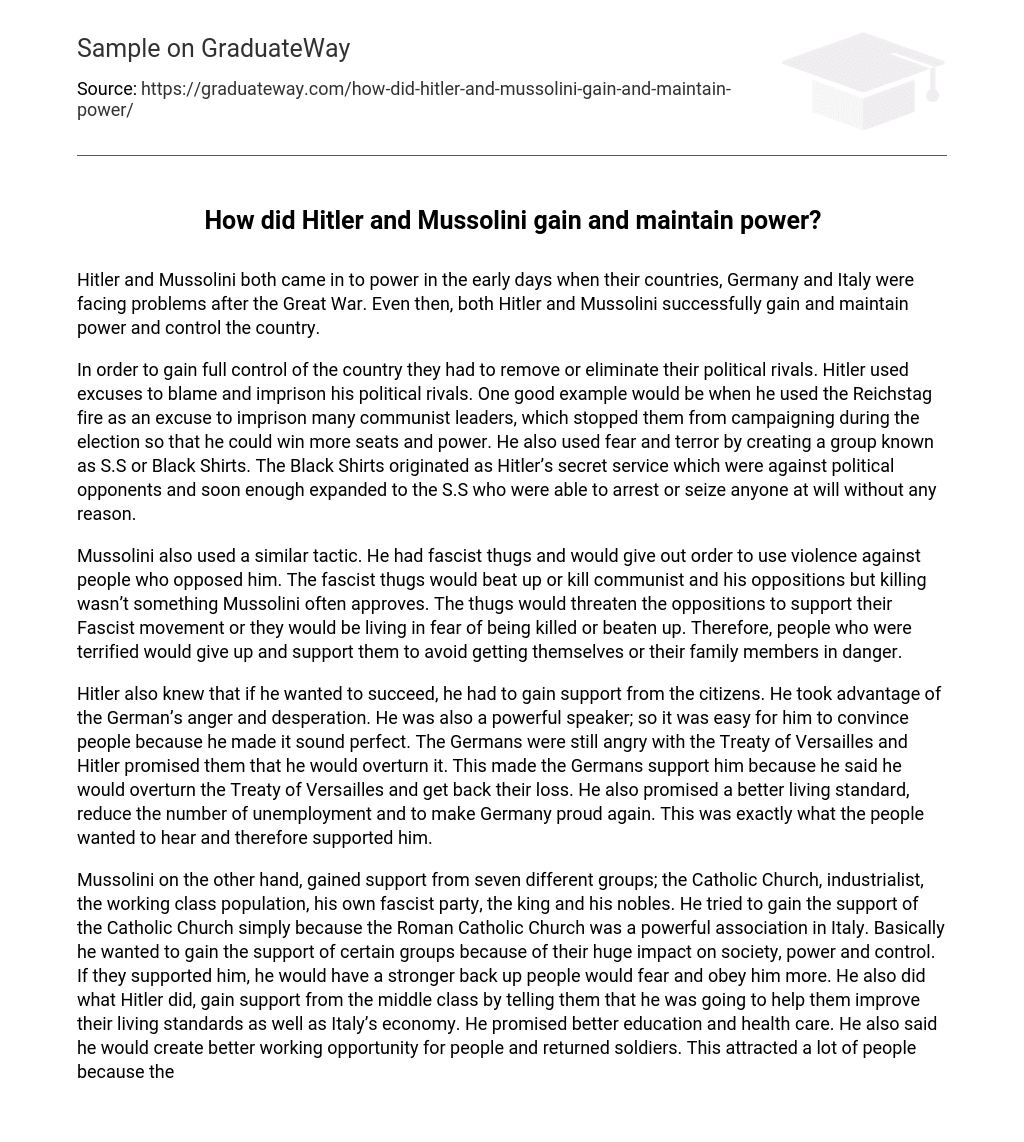Both Hitler and Mussolini rose to power during a time when their respective countries, Germany and Italy, were grappling with difficulties following the Great War. Despite these challenges, both leaders managed to acquire and retain control over their nations.
Hitler utilized various tactics to gain complete control of the country, one of which involved eliminating his political rivals. To achieve this, he would fabricate excuses to blame and incarcerate them. A notable instance of this was the Reichstag fire, which he exploited as an opportunity to imprison numerous communist leaders. This effectively hindered their election campaigning, thereby allowing Hitler to secure more seats and consolidate his power. Additionally, he instilled fear and terror by establishing the S.S, also known as the Black Shirts. Initially serving as Hitler’s clandestine unit to suppress political opponents, the Black Shirts eventually evolved into the S.S, possessing unrestrained authority to apprehend or seize individuals arbitrarily and without justification.
Mussolini employed a comparable method, deploying fascist hooligans to perpetrate violence against those who resisted him. Although Mussolini did not frequently condone killing, his fascist henchmen would intimidate and physically harm communists and opposing factions. They would coerce the opposition into backing the Fascist movement, lest they live in constant fear of potential harm or fatality. Consequently, individuals plagued by terror would capitulate and offer their support to safeguard themselves and their loved ones.
Hitler realized that in order to succeed, he needed to gain the support of the citizens. He capitalized on the anger and desperation felt by the Germans and proved to be a persuasive speaker, making his promises seem flawless. The Germans were still resentful towards the Treaty of Versailles, so Hitler pledged to revoke it, which won their support as they hoped to recover what they had lost. Additionally, he vowed to improve living conditions, decrease unemployment rates, and restore Germany’s pride. These were precisely the assurances that the people desired and consequently rallied behind him.
On the other hand, Mussolini sought support from seven different groups: the Catholic Church, industrialists, the working class population, his own fascist party, the king, and his nobles. He aimed to secure the support of these specific groups due to their significant influence on society, power, and control. By gaining their support, he believed he would possess a formidable backing that would inspire fear and obedience among the people. Similar to Hitler, Mussolini also aimed to garner support from the middle class by promising to improve living standards and Italy’s economy. His pledges included better education, healthcare, and enhanced employment opportunities for both civilians and returning soldiers. These promises attracted many individuals who hoped for a more favorable alternative to their current circumstances.
Despite the extreme nature of Hitler’s rule, he brought about improvements to Germany. He portrayed Germany as a powerful nation through clever military tactics, smart diplomatic agreements, and propaganda. Additionally, he successfully resolved Germany’s economic issues by the year 1929, dramatically decreasing unemployment from 6 million to only 300,000. This alleviated the suffering and struggles of many individuals, restoring a sense of pride within Germany. Consequently, other countries no longer looked down upon Germany or sought to initiate conflicts with them.
Mussolini made well-planned improvements in Italy, particularly in the areas of transportation, infrastructure, and farming. One significant accomplishment was his assistance in enhancing Italy’s transportation system, which greatly reduced inconvenience for Italians who were frequently affected by delayed trains. Additionally, Mussolini aided in the development of more efficient methods for generating and storing electricity, ultimately leading to improved timing and reliability of trains.
Hitler gained popularity by promising to bring about change and restore Germany to its former power. He achieved this by utilizing propaganda, such as films that highlighted Germany’s victories in past battles, to instill a sense of strength and pride in the German people. Additionally, through his speeches, Hitler managed to uplift the spirits of many Germans who were suffering from the aftermath of World War I. This positive impact on the citizens’ morale contributed to their perception of Hitler as a strong leader, dedicated to fighting for their rights and the wellbeing of Germany.
Mussolini, similar to Hitler, gained popularity by providing assistance to the Italians in their time of need. The people desired a powerful government that could restore their former strength. Additionally, Mussolini successfully enhanced the economy, transportation, and job prospects, greatly improving the lives of many individuals.
Fear and terror played a significant role in Hitler’s path to power. Hitler utilized fear to establish absolute control over individuals who opposed him. The German police were granted unlimited authority to arbitrarily arrest or imprison individuals. The populace also harbored a great fear towards Hitler’s personal army, the S.S, as they had the power to execute or assault them at will. People were well aware that if they spoke out against or criticized Hitler, they would inevitably face imprisonment, death, or deportation to concentration camps. Additionally, trade unionists, party leaders, and anyone else whom Hitler disliked were also sent to concentration camps. Consequently, this climate of fear instilled in citizens and adversaries alike a hesitation to oppose Hitler.
Mussolini employed fear and terror against his opponents, political rivals, and Jews. Viewing Jews and those who questioned him as threats, he took measures to eradicate them. Jews were dismissed from employment, expelled from educational institutions, and had their assets confiscated. Those who resisted him endured torture and imprisonment, while numerous communists faced unfounded accusations resulting in arrest.





